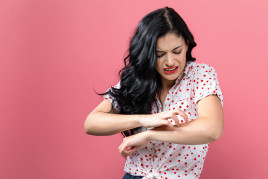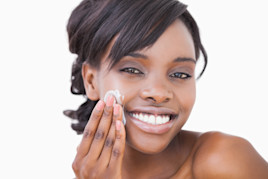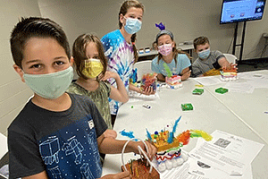8 reasons your groin itches and how to get relief
If genital itch has you devising ways to discreetly scratch, talk with your doctor about best way to get relief.

An itch in your groin area can be difficult to discuss with anyone, including your doctor. But it’s nothing to feel ashamed of. The problem is common, and it doesn’t necessarily mean that you have a sexually transmitted infection (STI).
Here are 8 reasons, aside from an STI, for itchy private parts along with tips for getting relief.
Jock itch. This is a common and treatable skin condition that’s caused by a fungus. It’s especially common in athletes because the fungus thrives on warm, moist skin that’s covered with tightly fitting clothing.
A common sign of jock itch is a red, scaly, and incredibly itchy rash, which can develop on the:Yeast infection. This is a common cause of:
Allergic reaction or irritation. This is a common and treatable cause of genital itch that develops in women, men, and children. Women seem especially prone because products, such as vaginal douches, feminine hygiene sprays, and scented panty liners can cause a reaction. Many other products, including perfumed soaps, wet wipes, and underwear can cause a reaction in anyone.
What can relieve the itch: To get relief, you need to avoid what’s causing the reaction. Once you can avoid it, the itch will gradually go away.
If you cannot figure out what’s causing the itch, see a gynecologist, allergist, or dermatologist for help.Psoriasis. If you have psoriasis, it’s important to know that psoriasis can develop in the genital area, appearing on the:
- Scrotum
- Vulva
- Anus
- Creases of the buttocks
- Upper thighs Most people who develop psoriasis on their genitals have psoriasis elsewhere. It’s important to know that when it develops on the genitals, psoriasis can look different. It may have less scale. The area tends to feel sore and itchy. Sometimes, the itch is intense.
Lichen planus. This common condition can cause a rash of small, itchy bumps on the skin. When it develops in the genital area, it often causes red, raw patches that can burn and itch. In the genital area, lichen planus can develop on the:
- Vulva
- Penis
- Anus What can relieve the itch: Treatment can relieve the itch and other symptoms as well as prevent the disease from worsening. For an accurate diagnosis and treatment, see a gynecologist or board-certified dermatologist.
Lichen sclerosus. This condition can cause white, thickened patches that develop on the:
- Anus
- Penis The patches may feel sore and itchy.
Pinworms. A pinworm infection tends to cause:
Skin cancer. It’s possible to get skin cancer in the genital area. Skin cancer can develop on the:
- Penis
- Scrotum
- The area between the scrotum (or vagina) and the anus
- Anus One symptom of skin cancer is an itch that does not go away. Other symptoms include pain, a lump, bleeding, or discharge.
Signs of a yeast infection, also known as candidiasis (can-duh-die-ah-sis) include thick vaginal discharge, burning, and itching.
What can relieve the itch: Start by seeing your gynecologist to make sure that you have a yeast infection. If you have a yeast infection, your gynecologist can recommend treatment that’s right for you. Many effective treatments exist.
What can relieve the itch: Treatment for genital psoriasis can relieve the itch. Because the genital area is sensitive, treatment for the genitals often differs from the psoriasis treatment that you apply to other parts of your body.
To find out how dermatologists treat genital psoriasis, go to: How can I treat genital psoriasis?
LS is more common when estrogen levels are low, so it usually develops in girls before they start menstruating and in postmenopausal women. It can also develop in young boys and men.
What can relieve the itch: The first step is to get an accurate diagnosis, so you want to see a gynecologist or board-certified dermatologist. Lichen sclerosus cannot be cured, but treatment can ease your discomfort and may prevent the disease from worsening.
When female pinworms get ready to lay their eggs, they travel to the person’s rectum. Females tend to lay their eggs inside the rectum while the person sleeps.
While a pinworm is inside the rectum, the anus can itch intensely. The itch can be so severe that it wakes someone from a sound sleep.
When people scratch their itchy anus, pinworms and eggs can get on their hands and under their nails. If they touch something, such as bedding or a doorknob, before washing their hands, the pinworms and eggs can land on these surfaces.
You can get pinworms when you touch a surface infected with pinworms, their eggs, or both, and then touch your mouth. From your mouth, the pinworms will travel to your intestines. Because pinworms often spread this way, they are most common in children.
What can relieve the itch: You need to see a doctor for an accurate diagnosis and treatment. If you have pinworms, usually everyone in your household will need treatment. This helps to prevent the parasite from passing from one person to another.
What can relieve the itch: If you suspect you have skin cancer in your genital area, see a board-certified dermatologist. Treatment can be life-saving. It can also relieve the itch.
An accurate diagnosis is the key to getting real relief
While you’ve just seen eight very different reasons for itchy private parts, there are many more, including hemorrhoids, menopause, and eczema. Several STIs can also cause your genitals to itch.
Seeing a board-certified dermatologist for an accurate diagnosis and treatment can protect your health and bring much welcomed relief.
Have a skin, hair, or nail problem?
No one understands your skin better than a board-certified dermatologist. Partner with the expert for the best care.
Image
References
Bunker, CB. “Diseases of the male genitalia”:654-75.
Janik MP and Heffernan MP. “Yeast infections: Candidiasis and tinea (pityriasis) versicolor”:1824.
Torgerson RK, Edwards L. “Diseases and disorders of the female genitalia”:675-83.
Centers for Disease Control and Prevention (CDC). “Parasites – Enterobiasis.” Page last updated January 13, 2013. Last accessed September 25, 2018.
Chi CC, Kirtschig G, et al. “Systematic review and meta-analysis of randomized controlled trials on topical interventions for genital lichen sclerosus.” J Am Acad Dermatol. 2012;67:305-12.
Paek SC, Merritt DF, et al. “Pruritus vulvae in prepubertal children.” J Am Acad Dermatol 2001;44: 795-802.
 Atopic dermatitis: More FDA-approved treatments
Atopic dermatitis: More FDA-approved treatments
 Biosimilars: 14 FAQs
Biosimilars: 14 FAQs
 How to trim your nails
How to trim your nails
 Relieve uncontrollably itchy skin
Relieve uncontrollably itchy skin
 Fade dark spots
Fade dark spots
 Untreatable razor bumps or acne?
Untreatable razor bumps or acne?
 Tattoo removal
Tattoo removal
 Scar treatment
Scar treatment
 Free materials to help raise skin cancer awareness
Free materials to help raise skin cancer awareness
 Dermatologist-approved lesson plans, activities you can use
Dermatologist-approved lesson plans, activities you can use
 Find a Dermatologist
Find a Dermatologist
 What is a dermatologist?
What is a dermatologist?
